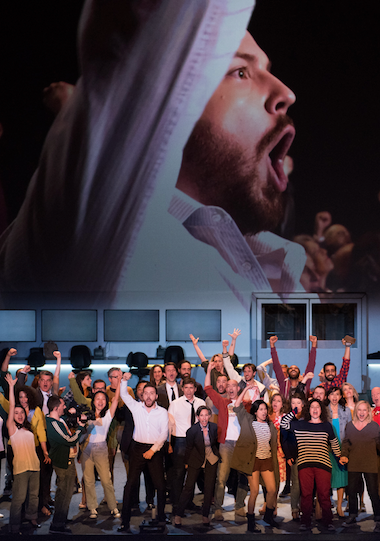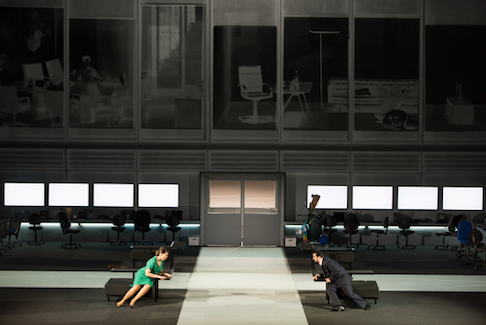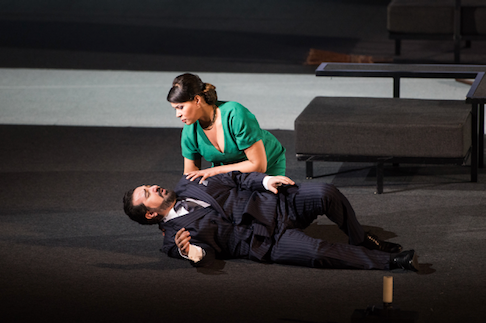
21 Mar 2018
Macbeth in Lyon
A revival of the Opéra de Lyon’s 2012 Occupy Wall St. production of Verdi’s 1865 Macbeth, transforming naive commentary into strange irony, some high art included.
English Touring Opera are delighted to announce a season of lyric monodramas to tour nationally from October to December. The season features music for solo singer and piano by Argento, Britten, Tippett and Shostakovich with a bold and inventive approach to making opera during social distancing.
This tenth of ten Live from London concerts was in fact a recorded live performance from California. It was no less enjoyable for that, and it was also uplifting to learn that this wasn’t in fact the ‘last’ LfL event that we will be able to enjoy, courtesy of VOCES8 and their fellow vocal ensembles (more below …).
Ever since Wigmore Hall announced their superb series of autumn concerts, all streamed live and available free of charge, I’d been looking forward to this song recital by Ian Bostridge and Imogen Cooper.
The Sixteen continues its exploration of Henry Purcell’s Welcome Songs for Charles II. As with Robert King’s pioneering Purcell series begun over thirty years ago for Hyperion, Harry Christophers is recording two Welcome Songs per disc.
Although Stile Antico’s programme article for their Live from London recital introduced their selection from the many treasures of the English Renaissance in the context of the theological debates and upheavals of the Tudor and Elizabethan years, their performance was more evocative of private chamber music than of public liturgy.
In February this year, Albanian soprano Ermonela Jaho made a highly lauded debut recital at Wigmore Hall - a concert which both celebrated Opera Rara’s 50th anniversary and honoured the career of the Italian soprano Rosina Storchio (1872-1945), the star of verismo who created the title roles in Leoncavallo’s La bohème and Zazà, Mascagni’s Lodoletta and Puccini’s Madama Butterfly.
Evidently, face masks don’t stifle appreciative “Bravo!”s. And, reducing audience numbers doesn’t lower the volume of such acclamations. For, the audience at Wigmore Hall gave soprano Elizabeth Llewellyn and pianist Simon Lepper a greatly deserved warm reception and hearty response following this lunchtime recital of late-Romantic song.
Collapsology. Or, perhaps we should use the French word ‘Collapsologie’ because this is a transdisciplinary idea pretty much advocated by a series of French theorists - and apparently, mostly French theorists. It in essence focuses on the imminent collapse of modern society and all its layers - a series of escalating crises on a global scale: environmental, economic, geopolitical, governmental; the list is extensive.
For this week’s Live from London vocal recital we moved from the home of VOCES8, St Anne and St Agnes in the City of London, to Kings Place, where The Sixteen - who have been associate artists at the venue for some time - presented a programme of music and words bound together by the theme of ‘reflection’.
'Such is your divine Disposation that both you excellently understand, and royally entertaine the Exercise of Musicke.’
Amongst an avalanche of new Mahler recordings appearing at the moment (Das Lied von der Erde seems to be the most favoured, with three) this 1991 Mahler Second from the 2nd Kassel MahlerFest is one of the more interesting releases.
‘And there was war in heaven: Michael and his angels fought against the dragon; and the dragon fought and his angels, And prevailed not; neither was their place found any more in heaven … that old serpent … Satan, which deceiveth the whole world: he was cast out into the earth, and his angels were cast out with him.’
If there is one myth, it seems believed by some people today, that probably needs shattering it is that post-war recordings or performances of Wagner operas were always of exceptional quality. This 1949 Hamburg Tristan und Isolde is one of those recordings - though quite who is to blame for its many problems takes quite some unearthing.
There was never any doubt that the fifth of the twelve Met Stars Live in Concert broadcasts was going to be a palpably intense and vivid event, as well as a musically stunning and theatrically enervating experience.
‘Love’ was the theme for this Live from London performance by Apollo5. Given the complexity and diversity of that human emotion, and Apollo5’s reputation for versatility and diverse repertoire, ranging from Renaissance choral music to jazz, from contemporary classical works to popular song, it was no surprise that their programme spanned 500 years and several musical styles.
The Academy of St Martin in the Fields have titled their autumn series of eight concerts - which are taking place at 5pm and 7.30pm on two Saturdays each month at their home venue in Trafalgar Square, and being filmed for streaming the following Thursday - ‘re:connect’.
The London Symphony Orchestra opened their Autumn 2020 season with a homage to Oliver Knussen, who died at the age of 66 in July 2018. The programme traced a national musical lineage through the twentieth century, from Britten to Knussen, on to Mark-Anthony Turnage, and entwining the LSO and Rattle too.
With the Live from London digital vocal festival entering the second half of the series, the festival’s host, VOCES8, returned to their home at St Annes and St Agnes in the City of London to present a sequence of ‘Choral Dances’ - vocal music inspired by dance, embracing diverse genres from the Renaissance madrigal to swing jazz.
Just a few unison string wriggles from the opening of Mozart’s overture to Le nozze di Figaro are enough to make any opera-lover perch on the edge of their seat, in excited anticipation of the drama in music to come, so there could be no other curtain-raiser for this Gala Concert at the Royal Opera House, the latest instalment from ‘their House’ to ‘our houses’.
"Before the ending of the day, creator of all things, we pray that, with your accustomed mercy, you may watch over us."

A revival of the Opéra de Lyon’s 2012 Occupy Wall St. production of Verdi’s 1865 Macbeth, transforming naive commentary into strange irony, some high art included.
It’s a hard stretch of imagination indeed to connect the dynastic intrigue of Verdi’s opera (and this is Shakespeare’s play) with money hungry stock trading witches. Nonetheless the high tech trading room provided a rich backdrop of arbitrary decor — binary numbers flashing on countless monitors, the myriad screens morphing into interpretive pop television images from time to time, the entire back wall of the white stage box becoming a gigantic TV screen of surveillance camera images of the opera’s murders, its apparitions, and the TV reportage of Occupy Wall St.
All this was simply the counterpoint of passionate pursuit of riches to an intense Freudian drama playing out center stage, Lady Macbeth nurturing the ambitions of her husband Macbeth with her idea of a realpolitik — the simple elimination of competing parents and their progeny. These acts evolved into the couple’s shared moral and physical sterility that precluded all possibility of creating their own succession.
 Lady Macbeth and Macbeth, above is negative projection of soon-to-be-murdered Duncan's rooms
Lady Macbeth and Macbeth, above is negative projection of soon-to-be-murdered Duncan's rooms
Stage director Ivo van Hove defied Verdi’s wishes for a Lady Macbeth of ugly voice and overt madness by creating a full breasted, nurturing Lady Macbeth of powerful, even beautiful voice to match her fully confident if morally hesitant and certainly beautifully voiced husband. Mr. Van Hove further defied Verdi (and Shakespeare) by ultimately joining husband and wife into one tortured being, Macbeth shadowing and suffering with Lady Macbeth in her final moments of torture. His ultimate spousal compassion was his strangulation of Lady Macbeth.
This was not the blood and thunder Verdi of political action, it was a Verdi of bel canto, two tortured beings singing themselves into a complicity of mutual understanding that was to become their destruction. It was the stuff of high tragedy.
Conductor Daniele Rustioni found the precise balance between beautiful singing and stinging feeling countered from time to time with Verdi’s interwoven compassionate flute and oboe solos. Mo. Rustioni worked unrelentingly with Azerbaidjan baritone Elchin Azizov, a fine singer and a gifted actor, and Italian soprano Susanna Branchini, a physically and musically elegant singer to find and musically achieve this latent, and very real human tragedy.
 Macbeth and Lady Macbeth
Macbeth and Lady Macbeth
Director van Hove wittily introduced a silent, observant black janitress who cleaned up the messes left on stage — the trader/witches’ printouts, Lady Macbeth’s bloody rags, the thrown chairs — and generally replaced the grim emotional residue with a stoic calm. She was a pointed, sarcastic comment on big money.
Director van Hove’s chorus scenes were masterfully configured, the chorus of female witches spread around the edges of the huge white box stage, its disembodied sound coming together in occasional center stage groupings. Of particular effect was the staging of the chorus of Scottish refuges, here something like later day East Coast flower children, who emerged in solo movements to animate individual suffering.
The opera’s triumphal chorus was a Occupy Wall Street camp bacchanal of live TV coverage including an gigantic cameo of beautifully sung lines by Macduff, Russian Arseny Yakovlev. There were splendid takes of cocky young Malcolm, the new king, sure to soon become, together with the balance of the Occupy Wall Street demonstrators, as greedy as Mr. and Mrs. Macbeth.
And such inevitable domestic tragedies to begin anew.
Maybe Mr. Van Hove did not have this resolution in mind when he created this production in the aftermath of the 2008 financial markets crisis and the 2011 demonstrations. But his fine production has discovered unexpected new resonance.
It was a splendid evening of beautifully produced opera.
Michael Milenski
Cast and production information:
Macbeth: Elchin Azizov: Lady Macbeth: Susanna Branchini; Banco: Roberto Scandiuzzi; Macduff: Arseny Yakovlev; Médecin: Patrick Bolleire; Malcolm: Louis Zaitoun. Chorus and orchestra of the Opéra de Lyon. Conductor: Daniele Rustioni: Mise en scène: Ivo van Hove; Décors et lumières: Jan Versweyveld; Costumes: Wojciech Dziedzic; Vidéo: Tal Yarden. Opéra de Lyon, March 15, 2018.